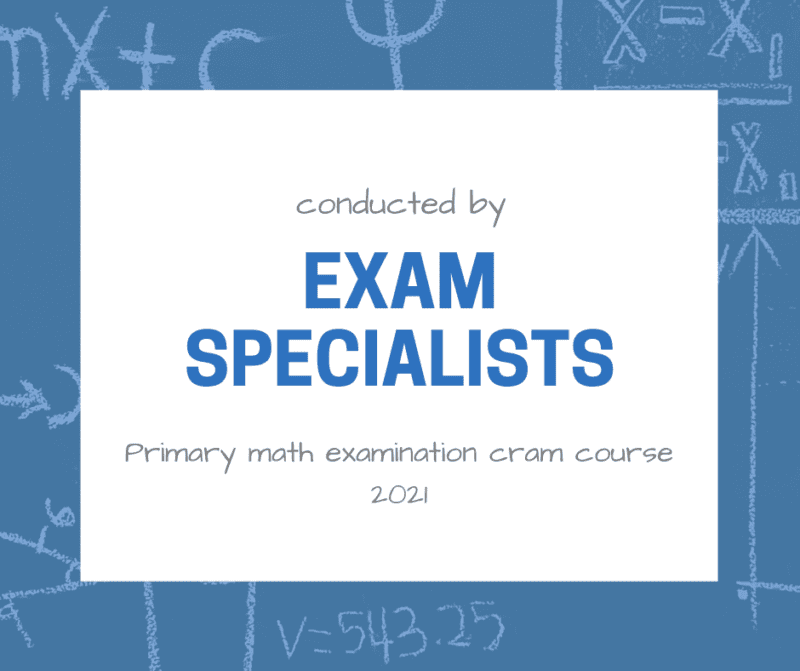Top 3 problems (and solutions) faced by students for their PSLE math paper [2021]
[ updated: June 2021 ]
In this article, we will focus on the issues that PSLE candidates face during their revision and how to handle such issues.
We will go through the following difficulties:
- “I always spend too much time on the short answer question and got no time for the long problem sums”
- “I can’t finish the paper” .time management, speed of writing
- “I’m tired / no energy to revise”

Problem #1:
“I always spend too much time on Paper 2’s short answer questions and got no time for the long problem sums”
Why:
Our exam specialists say this, “This is a common problem surfaced by many students in our Elite PSLE Digital Cram Course because they spent an excessive amount of time on the 2 and/or 3 marks questions.” After many cycles of feedback analysis, they went on to say, “our students remarked that it is mostly because they either:
Reason 1: spent too much time checking their answers, which isn’t a bad thing, or
Reason 2: they get hung up on questions that they are not that confident in and spend an unnecessary amount of time trying to decode that 1 or 2 particular shorter questions, thus leaving them with less than enough time to work on the rest of the longer problem sums.
This indicates an underlying fear of losing those 1 or 2 marks and most students do not comprehend the concept of opportunity cost and how their time can be better spent on questions that they are more confident in in order to gather the highest amount of marks in the shortest period of time.
Solution:
Step 1 – Dissect their fears
- The most effective way to deal with this issue is to first help them to dissect their reasons for their behavior of spending an unnecessary amount of time on those shorter questions.
- Nanolectures exam specialists suggested that talking to your child about this issue will help them to understand the reason behind their instincts. Refrain from scolding nor ‘preaching’ at this stage.
After that, it will be the best time to help them to come up with a fixed amount of time to be spent on each section of the paper.
Step 2 – Teach them how to allocate their time
- Students are allocated 90 mins to complete Paper 2, a total of 55 marks.
- A good rule of thumb is to complete the first 5 questions (worth 2 marks each) in 12 mins or less. For the rest of the question, the student should not spend more than 1.5 – 2 minutes for each allocated mark.
- For example, if question 15 is worth 4 marks, students should not spend more than 6 minutes on question 15.
- This includes time spent on drawing models, creating a guess-and-improve chart and checking of their answers.
If they can’t finish the question, they have to move on to another question. The only exception is if the students feel that they just need less than 1 minute to complete fully that particular question.
Example:
Paper 2 (55 marks, 90 minutes)
Question 1 to Question 5. 10 marks. 12 minutes.
Question 6 onwards. 45 marks. 67.5 – 78 minutes
Total: 90 minutes
Requirement:
A parent or tutor who is well-versed with the math exam syllabus.
Length of time needed:
30 mins to 1 hr of consultative analysis and repetition over a 2 months period for this new habit to really sink in.
Problem #2:
“I can’t finish the paper”
Why:
This issue is moderately linked with Problem 1 as mentioned above. However, our examination specialists do understand that there are other factors at play.
- One of the factors is that the students simply do not have sufficient instances of timed practices.
- This is because most tutors and/or parents typically allow ‘unlimited’ time for the student to complete 1 exam practice with the instructions of ‘finish this by the next lesson’ or ‘complete this by tomorrow’.
This is the wrong approach because this method is trying to enhance students’ knowledge of exam questions but it does nothing to help students be prepared for the limited time they are given during examination.
Solution:
Instead of just getting the student to do exam practice papers, get them to do 1 set with a time limit and another set without any time limit.
- This will allow students to be able to analyze and understand exam-standard questions more deeply as well as
- get sufficient ‘real-world’ practice on PSLE exam setting.
- This also means limited toilet breaks during the paper, no background music, no munching of tidbits nor sipping of bubble tea.
- Simulate the exam conditions as closely as possible to allow for maximum benefits.
Requirement:
Suitable exam papers whose difficulty level mirror the usual PSLE standard set (with answer keys).
- This means that parents should avoid letting their children do preliminary exam papers from Nanyang Girls’ School or Raffles Girls’ School
- because their preliminary exam papers are famous for their high standards and
- do not usually parallel the difficulty level of normal PSLE math exam papers.
Problem #3:
“I’m physically tired / no energy to revise”
Why:
Many reasons for this, most of them are easy to spot- insufficient rest, revising after a tough day of sports, sickness etc. However, what Nanolectures do know is that after years of integrative-holistic examination preparation by our exam specialists, we found out that diet plays a major role in this issue.
- Most tutors don’t address the issue of diet planning when it comes down to examination preparation.
- With that said, they are tutors and not exam specialists, and our job scopes are vastly different.
Exam specialists know that the type of food and the timing of eating plays a big part in deciding whether a student feels energetic and ready for revision or feels fatigue and lethargic whenever they look at their revision notes.
- They know exactly what to eat before students start on an exam paper practice and
- know exactly what not to eat before students begin their PSLE revision at home.
Therefore, when your children say that they are tired or fatigued or that they can’t keep their eyes open, refrain from scolding and berating them for being lazy and take a closer look at the food they have had.
Understand this:
Ever noticed that you’ll be lethargic after your lunch?
- Most working adults have a heavy lunch to compensate for the paltry amount of breakfast they had in the morning. Also, most of their lunch consists of either rice (white / oily) or noodles, both of which are processed carbohydrates.
Our body loves carbohydrates, our stomach and small intestine can process carbohydrates (especially processed food) very quickly. This will cause us to suffer from the so-called ‘food coma’ or lethargy after a full lunch.
Similarly, take a look at what your children have.
- Is it a plateful of white rice or noodles?
- Even if it is brown rice, take a look at the amount, did your children eat to 100% or 60% capacity?
All these play a part in deciding how tired a child will be after a meal.
Solution:
Before your children start on their afternoon or evening revision, ensure that their diet is full of healthy protein. Our exam specialist recommends
- chicken rice (with only half portion of oily rice) or
- mixed vegetable with 1 portion of meat, 1 portion of tofu and 1 portion of non-oily vegetable with as little white rice as possible.
In addition, always remind them to eat till they feel 60% full and not 100% and never overeat. The minimal amount of rice and noodle will decrease the chances of feeling tired or feeling sluggish. Also, the protein will ensure that your children won’t feel hungry so soon, this is because our body takes a longer time to digest protein (meat, tofu, etc) and therefore, it will keep your children feeling full for a longer period of time.
Lastly, avoid letting your children drink sugary drinks before revision.
- Drinks like Cola or bubble tea should not be allowed at all.
- This is because children (and adults) severely underestimate the sheer amount of sugar inside each drink and the impact it can have on our brain.
- Drinks with high sugar content may elevate our energy level or our ‘alertness’ for 15 to 30 mins.
After that, it will lead to the so-called ‘sugar crash’ and that is when tiredness will set in very quickly and students won’t be able to concentrate on the learning materials in front of them.

Looking for math exam crash course?
- MVTA: Our MVTA (multi-variated topical analysis) syllabus is the only one in Singapore that separates every single topic into their individual question types.
- All primary levels: Our exam crash courses are currently available for P1 – P6 students.
- Exam questions focus: our students enjoy our exclusive syllabus to gain competency in each question type that always appear in exams.
- Speed: Gain exam proficiency in 3 months or less with our MVTA syllabus
